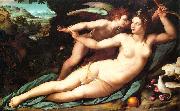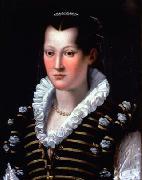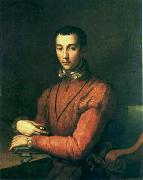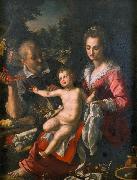Alessandro Allori El petróleo que Pinta la ReproducciónAll Alessandro Allori Oil Paintings(May 3, 1535 - September 22, 1607) was an Italian portrait painter of the late Mannerist Florentine school. Born in Florence, in 1540, after the death of his father, he was brought up and trained in art by a close friend, often referred to as his 'uncle', the mannerist painter Agnolo Bronzino, whose name he sometimes assumed in his pictures. In some ways, Allori is the last of the line of prominent Florentine painters, of generally undiluted Tuscan artistic heritage: Andrea del Sarto worked with Fra Bartolomeo (as well as Leonardo Da Vinci), Pontormo briefly worked under Andrea, and trained Bronzino, who trained Allori. Subsequent generations in the city would be strongly influenced by the tide of Baroque styles pre-eminent in other parts of Italy. |
|||

|
|||
|
|
|||
|
||||||||
| Alessandro Allori (May 3, 1535 - September 22, 1607) was an Italian portrait painter of the late Mannerist Florentine school. Born in Florence, in 1540, after the death of his father, he was brought up and trained in art by a close friend, often referred to as his 'uncle', the mannerist painter Agnolo Bronzino, whose name he sometimes assumed in his pictures. In some ways, Allori is the last of the line of prominent Florentine painters, of generally undiluted Tuscan artistic heritage: Andrea del Sarto worked with Fra Bartolomeo (as well as Leonardo Da Vinci), Pontormo briefly worked under Andrea, and trained Bronzino, who trained Allori. Subsequent generations in the city would be strongly influenced by the tide of Baroque styles pre-eminent in other parts of Italy. |
||||||||
|
|
||||||||
| Pintura identificación:: 84656 Venus and Cupid Date second half of 16th century Medium Oil on wood cjr |
||||||||
|
|
||||||||
| Pintura identificación:: 90010 Portrat Isabella de Medicis from 1575(1575) until 1599(1599) Medium oil on panel Dimensions 56 x 44 cm (22 x 17.3 in) cjr |
||||||||
|
|
||||||||
| Pintura identificación:: 92120 Portrait of Francesco de' Medici. c. 1560(1560) Medium oil on canvas Dimensions 98 X 79 cm (38.6 X 31.1 in) cjr |
||||||||
|
|
||||||||
| Pintura identificación:: 97304 Sagrada Familia 1602(1602) Medium oil on canvas Dimensions 148 X 114 cm cyf |
||||||||
|
|
||||||||
| ARTISTA PREVIO PROXIMO ARTISTA | ||||||||
|
|
||||||||
|
Alessandro Allori (May 3, 1535 - September 22, 1607) was an Italian portrait painter of the late Mannerist Florentine school. Born in Florence, in 1540, after the death of his father, he was brought up and trained in art by a close friend, often referred to as his 'uncle', the mannerist painter Agnolo Bronzino, whose name he sometimes assumed in his pictures. In some ways, Allori is the last of the line of prominent Florentine painters, of generally undiluted Tuscan artistic heritage: Andrea del Sarto worked with Fra Bartolomeo (as well as Leonardo Da Vinci), Pontormo briefly worked under Andrea, and trained Bronzino, who trained Allori. Subsequent generations in the city would be strongly influenced by the tide of Baroque styles pre-eminent in other parts of Italy. |
||||||||
|
|
||||||||
|
CONTACTE EEUU |









